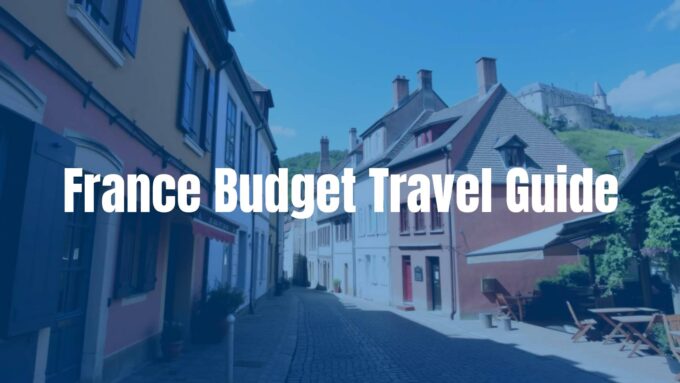When you think about a trip to France, you probably picture sitting in cozy cafes, seeing famous sights, and tasting delicious foods. France is a favorite for many travelers. Still, even experienced visitors sometimes make simple mistakes that make their trip a little less enjoyable. Knowing these errors before you go can help your time in France run smoothly, so you enjoy your discoveries instead of dealing with avoidable problems.
This guide shows you the most common travel mistakes people make in France and gives you tips to help you get around like someone who lives there. We’ll touch on basic manners, how people eat, how to get around, and much more-everything you need to know to get the most out of your visit.

Frequent Mistakes Tourists Make in France
Thinking Everyone Speaks English
Many visitors believe they can get by with only English, but that’s not always true-even in big cities. While some French people understand English, it’s best not to count on it everywhere. It’s always polite to try a few words in French. Just saying hello (“Bonjour”), thank you (“Merci”), or asking if someone speaks English can help break the ice and lead to friendlier conversations. Even if your French isn’t perfect, making an effort usually gets a positive response.
Not Using Basic French Manners
Good manners are very important in France. Always remember to greet people when you enter a shop (“Bonjour” or “Bonsoir”), say please (“S’il vous plaît”), and thank you (“Merci beaucoup”). Skipping these courtesies can come across as rude, especially in Paris. These small words will go a long way in making your experience more pleasant.
Missing Social Etiquette
Being polite goes beyond just greetings. For example, keep your voice down in public places, and pay attention to how locals behave at the table. At restaurants, try not to cut your salad with a knife-use your fork. Watching the people around you is a good way to learn what to do.
Only Using Cards and Not Having Cash
While credit cards work in most large places, you may find some cafés, small markets, or shops that only take cash or have a minimum for card payments. Bring some Euros for tips or small purchases. When you pay with your card, choose to pay in Euros (not your home currency) for a better exchange rate.
Eating and Drinking While Walking
Unlike in some countries, walking while eating or drinking isn’t common in France. People prefer to relax and enjoy their meals in cafés or at a table. Take your time and enjoy the moment-locals will notice your appreciation for their culture.

Touching Goods Without Permission
If you’re in a store or market, don’t pick up items without asking. In markets, especially, point to the produce you want and let the vendor select it. This shows respect for their displays and for hygiene.
Culture and Social Mistakes
Not Following Dress Codes
People in France, especially in Paris, like to dress well. Flashy sneakers, sweatpants, or clothes that scream “tourist” can attract attention in a bad way. It’s safer to wear classic clothes in simple colors. Comfortable walking shoes are best, but save very casual outfits for other times. Dressing smartly can also help avoid unwanted attention.
Dressing Like a Tourist
Wearing fanny packs, big logos, or workout clothes outside the gym makes it obvious you’re not local. Instead, go for simple, fitted clothes-like jeans, a nice top, and casual sneakers. You’ll fit in better and stay comfortable too.

Being Too Loud in Public
The French value quiet and privacy in public. Speaking loudly in places like the Metro, in museums, or in restaurants seems rude. Keep your voice down, and you’ll be respected for it.
Not Knowing Meal Times
Restaurants in France have set meal hours. Lunch usually happens from noon to 2:15 pm, and dinner starts after 7 pm. Many close between lunch and dinner. Don’t expect to eat out whenever you like-plan meals ahead and look for places with “service continu” if you need to eat at odd hours.
Restaurant Mistakes to Steer Clear Of
Not Making Reservations
In popular places, especially in Paris, it’s hard to get a table at well-known restaurants without a reservation. Book online or call ahead to get the spot you want, especially during busy times.
Not Trying Local Foods
France is famous for its food! Don’t just stick to what you know or eat at international chains. Try local bread, cheese, and special dishes from the area you’re in. Ask your server for recommendations, or try smaller places off the tourist trail for more real French cooking.

Confused About Tipping
Service is almost always included in your bill (“service compris”). You don’t need to leave a big tip. If you want, leave a couple of Euros for great service, but it isn’t required. Leave tips in cash and not on your card.
Expecting Fast Service or the Bill Instantly
Meals in France are slow and meant to be relaxed. Waiters won’t bring your bill unless you ask (“L’addition, s’il vous plaît”). Sit back, enjoy your food, and don’t be in a hurry. If you need to leave quickly, tell your server early.
Yelling for the Waiter
Calling out “Garçon!” is rude. Instead, make eye contact or give a small wave, then politely say “S’il vous plaît.” Kindness and patience are much appreciated.
Not Understanding the Dining Pace
Expect your lunch to last about an hour and dinner to go even longer. Meals are a time for conversation. If time is tight, let your server know, but understand not all places can serve you faster.
Shopping and Money Mistakes
Touching Market Produce
At French markets, let the vendor pick your items. Indicate what you want and how much, then let them choose. It’s better for cleanliness and shows respect.
Paying in Dollars or Using the Wrong Credit Card
Use Euros for all purchases. Don’t expect stores to take US dollars. Use a credit card with a chip and PIN, since swipe cards aren’t always accepted. Smaller stores may only accept cards for larger purchases, so have cash ready.
Forgetting a Shopping Bag
Shops often charge for bags. Bring your own reusable bag-this saves money, helps the environment, and makes it easier to carry what you buy.
Ignoring VAT Refunds
If you live outside the EU and buy a lot in one store (usually over €100), ask for VAT refund paperwork. Show your passport, get the forms, and submit them at the airport when you leave. This can save you 12-20% on your purchases, but make sure you have time at the airport to complete the process.
Getting Around: Common Mistakes
Not Using the Paris Metro
The Metro in Paris is fast, simple, and covers almost everywhere you want to go. It’s much cheaper and often quicker than taxis or ride shares. Get familiar with the map and buy the right kind of ticket for how much you plan to travel.
Choosing the Wrong Metro Pass
There are lots of ticket types-single rides, packs of ten, or passes for a few days. Look at how often you’ll use public transport and buy the best option. Sometimes carnets (packs of 10 tickets) are cheaper and more flexible than a day pass.
Overpaying for Taxi Rides
Official Paris taxis are marked “Taxi Parisien.” There are set prices for rides to and from airports: for example, €56 from CDG to the Right Bank. Uber is also available with clear pricing. Always check if you are using an official taxi to avoid overpaying.
Missing Out on Trains to Other Cities
France’s trains are comfortable and fast. The high-speed TGV and regional trains can take you quickly between cities or out to the countryside. This is often easier and nicer than flying or driving yourself.

Underestimating Travel Distances
France is a large country, and getting from Paris to places like Nice or Strasbourg takes hours, even by train. Don’t try to fit too many far-away places into a short trip. Pick areas that are close together to make your days easier and less rushed.
Trip Planning Problems
Packing Your Days Too Full
If you cram every hour with sightseeing, you’ll end up tired and stressed. Aim for two or three main things each day and leave time for wandering, relaxing, or stumbling upon something new. Unplanned time often leads to your best memories.
Forgetting to Buy Tickets Ahead of Time
Big tourist spots like the Eiffel Tower or Louvre Museum often have long lines. Buying tickets online with a set time saves you hours. Book as early as you can for the best times and to avoid disappointment.
Ignoring Opening Hours or Closures
Shops, museums, and restaurants can be closed on certain days, like many museums on Mondays or shops on Sundays. In August, some businesses even shut down for vacations. Always check opening days and hours ahead of time.
Only Visiting Paris
Paris is wonderful, but France has much more to offer. Examples are Bordeaux, Normandy, the Côte d’Azur, and Provence. Even a day trip by train can let you see a new side of the country.

Trying to Find Last-Minute Deals in the Busy Season
In summer and during holidays, flights and hotels usually fill up early and cost more. Book your arrangements as far ahead as possible, especially for peak travel times. Winter is a better time to look for late deals.
Thinking Spring or Summer Are the Only Good Times to Visit
Visiting in fall or winter means fewer tourists, lower prices, and sometimes cooler festivals and markets. If you want to avoid crowds or save money, skip the busy season.
Staying Safe and Connected
Leaving Valuables Unattended
Theft can happen, especially in crowds or popular areas. Don’t leave your phone or bag in easy reach. Use a cross-body, zippered bag or keep things in your front pocket. Store important documents in the hotel safe or a hidden travel pouch.
Falling for Scams or Pickpockets
In big cities, be cautious of people who try to distract you with petitions, “dropped” jewelry, or games. Always keep your bag closed and hold it in front of you. Don’t carry a lot of cash, and keep electronics out of sight in busy areas.
No Travel Insurance
Even if you think nothing will go wrong, it’s smart to have insurance. Hospital visits and replacements for lost items are expensive. Insurance covers medical emergencies, lost luggage, and canceled plans-giving you peace of mind.
No Reliable Internet Plan
Don’t just depend on café Wi-Fi, which may be slow or not secure. Buy a local SIM card, rent a portable hotspot, or check if your home phone plan covers France. Having internet access helps with maps, translations, and keeping in touch.
Helpful Tips for a Better Trip
Learn Basic French Words
A few simple words like “s’il vous plaît” (please), “parlez-vous anglais?” (do you speak English?), and “où sont les toilettes?” (where is the bathroom?) make it much easier to get help and show respect. Even if your accent isn’t perfect, locals appreciate your effort.
Book Reservations and Plan Ahead
For restaurants, museums, and tours, booking in advance saves you time and stress. It lets you enjoy your days without worrying about availability. Always check open days and hours before you visit.
Follow the Local Pace
Life in France can move slowly-meals and service aren’t rushed. Pay attention to how locals act and join them. This makes your experience better and less stressful.
Explore Beyond Paris
France’s regions all have their own special food, scenery, and traditions. Try a train ride to another area, or plan a few days outside the capital city for a wider view of French life.
Common France Travel Questions
| Question | Quick Answer |
|---|---|
| How do I travel inside France? | Use high-speed trains (TGV) between cities, the Metro within cities, and rent a car for countryside trips. Mixing trains and public transport usually works best. |
| Do I need to speak French? | No, but learning a few key words and polite phrases is very helpful and appreciated. |
| Should I tip at French restaurants? | Service is usually included in the bill. You can still leave a small amount for good service, but it’s not mandatory. |
| How do I avoid tourist traps? | Don’t eat right next to major sights, avoid buying from street vendors, and be careful with street scams. Eat a few streets away and buy from real shops instead. |












Leave a comment